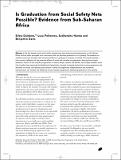| dc.contributor.author | Daidone, Silvio | en |
| dc.contributor.author | Pellerano, Luca | en |
| dc.contributor.author | Handa, Sudhanshu | en |
| dc.contributor.author | Davis, Benjamin | en |
| dc.date.accessioned | 2016-01-04T13:44:05Z | |
| dc.date.available | 2016-01-04T13:44:05Z | |
| dc.date.issued | March 2015 | en |
| dc.identifier.citation | Daidone, S., Pellerano, L., Handa, S. and Davis, B. (2015) Is Graduation from Social Safety Nets Possible? Evidence from Sub?Saharan Africa. IDS Bulletin 46(2): 93-102 | en |
| dc.identifier.issn | 1759-5436 | en |
| dc.identifier.uri | https://opendocs.ids.ac.uk/opendocs/handle/20.500.12413/7288 | |
| dc.description.abstract | In the last decade social cash transfer programmes have become extremely popular in sub?Saharan Africa, and are often portrayed as an instrument that can facilitate graduation out of poverty. The evidence on whether social cash transfers have had actual effects on graduation, however, is limited. This article provides a cross?country reflection of the potential effects of social cash transfers on graduation, drawing from impact evaluation results of cash transfer programmes in Ghana, Kenya, Lesotho and Zambia. We analyse whether social cash transfers have improved the likelihood of graduation, through increased productivity, income generation and resilience to shocks. We identify which factors in terms of programme implementation and household characteristics can increase the likelihood of cash transfer programmes facilitating graduation from poverty. | en |
| dc.format.extent | 10 | en |
| dc.publisher | © 2015 Institute of Development Studies | en |
| dc.relation.ispartofseries | IDS Bulletin Vol. 46 Nos. 2 | en |
| dc.rights.uri | http://www.ids.ac.uk/files/dmfile/IDSOpenDocsStandardTermsOfUse.pdf | en |
| dc.title | Is Graduation from Social Safety Nets Possible? Evidence from Sub?Saharan Africa | en |
| dc.type | Article | en |
| dc.rights.holder | © 2013 The Author. IDS Bulletin © 2013 Institute of Development Studies | en |
| dc.identifier.doi | 10.1111/1759-5436.12132 | en |

